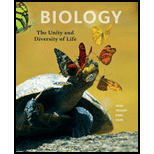
Concept explainers
Concept introduction: Antigens are targeted by antibodies. The antigen will interact with the antibody that matches the antigen’s molecular structure. Antigens are peptides, polysaccharides, or lipids. Antigens can be self-antigens that originate within the body or can be non-self-antigens that originate from the external environment.
Answer to Problem 1SQ
Correct answer: Antigens trigger immune responses. Therefore, option d. is correct.
Explanation of Solution
Reasons for the correct answer:
Antigens are molecule capable of inducing an immune response. The antigens such as pathogen-associated molecular patterns (PAMP) trigger the innate immunity. Innate immunity is a set of defensive mechanism that prevents the entry of pathogens in to our body. The activation of the innate immunity triggers the adaptive immunity.
Option d. is given as “Antigens”. As the antigens trigger immune responses option d. is correct.
Reason for incorrect answer:
Option a. is given as “Cytokines”.
Cytokines are signaling molecules that coordinate the activities of the white blood cells. Therefore, option a. is incorrect.
Option b. is given as “Lysozyme”.
Lysozome is an antimicrobial enzyme produced by animals as a part of innate immune system. Therefore, option b. is incorrect.
Option c. is given as “Antibodies”.
Antibodies are produced in the body against the antigen. Therefore, option c. is incorrect.
Option e. is given as “Histamines”.
Histamine is an organic nitrogenous compound that plays a central role in allergic reactions. Therefore, option e. is incorrect.
Option f. is given as “all of the above”.
Cytokines, lysozyme, antibodies, histamines do not trigger immune responses. Therefore, option f. is incorrect.
Hence, options a., b., c., e., and f. are wrong answers.
Want to see more full solutions like this?
Chapter 37 Solutions
Biology: The Unity and Diversity of Life (MindTap Course List)
- The two major types of phagocytic cells are_________ and_________. Select one: a. neutrophils; monocytes b. monocytes; macrophages c. eosinophils; T cells d. lymphocytes; monocytes e. neutrophils; macrophagesarrow_forward________ are released by helper T cells to mobilize immune cells and macrophages and attract other leukocytes into the area. A. Interleukin 2 proteins B. Lymphokines C. Interleukin 1 proteins D. Monokines Explain correct answer.arrow_forwardinterferons: a. cause inflammation b. inhibit viral infection c. aid in phagocytosis d. decrease the body temperaturearrow_forward
- which two of following statements are true for an antigen prsent cell such as dendritic cell? a. Phagocytes are extra cellular pathogens b. Display processed pathoic peptide on the surface of the cell c. Produce antibodies specific for a pathogen d. Activate naive erythrocytesarrow_forwardAntibodies are______ . a. antigen receptors c. proteins b. made only by B cells d.all of the abovearrow_forwardWhich cells produce antibodies? a. Neutrophils. b. Dendritic cells. c. Cytotoxic T cells. d. Plasma cells. The role of the humoral immune response is to a. kill infected cellsb. fight pathogens found in body fluid c. prevent pathogens from entering the body d. initiate an inflammatory responsearrow_forward
- B cells that produce and release large amounts of antibody are called: a. Memory cells b. Basophils c. Plasma cells d. Killer cells e. Neutrophilsarrow_forwardThe detrimental effects of Lupus erythematosis are initiated by A. activated T cells attacking myelin B. immune complexes lodging in capillaries C. lack of activated CD4+ cellsarrow_forwardMonocytes are ____________- leukocytes that develop into _________- .a. granular, phagocytes b. agranular, mast cells c. agranular, macrophages d. granular, T cellsarrow_forward
- Explain why each choice (a-d) is correct or incorrect. Allergens differ from antigens because a. Allergens produce an abnormally large immune response to what is an otherwise harmless particle. b. Allergens do not involve the leucocytes, they simple stimulate the inflammatory response. c. Allergens are only active seasonally and are generally harmless to the body. d. Allergens are primarily plant derived while antigens are bacterial or viral in nature.arrow_forwardT cells that secrete cytokines that help antibodyresponses are called ________.a. Th1b. Th2c. regulatory T cellsd. thymocytesarrow_forwardWhich of the following is not part of the innate immune system? a. Antibodies b. Skin c. Enzymes d. Neutrophilsarrow_forward
 Medical Terminology for Health Professions, Spira...Health & NutritionISBN:9781305634350Author:Ann Ehrlich, Carol L. Schroeder, Laura Ehrlich, Katrina A. SchroederPublisher:Cengage Learning
Medical Terminology for Health Professions, Spira...Health & NutritionISBN:9781305634350Author:Ann Ehrlich, Carol L. Schroeder, Laura Ehrlich, Katrina A. SchroederPublisher:Cengage Learning
